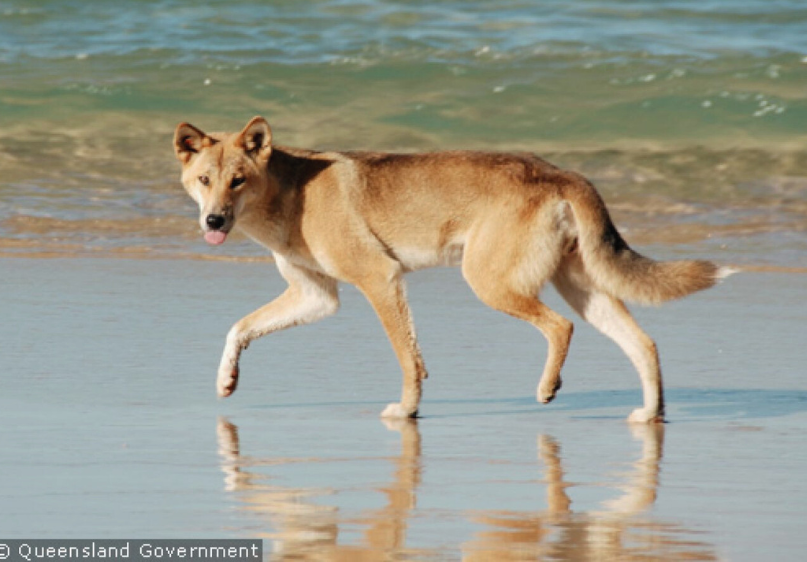Estimated reading time: 0 minutes
Despite well-publicised dingo attacks on K’gari (Fraser Island), visitors are still ignoring the safety rules and putting themselves, and the animals, at risk.
We speak with experts to learn more about the native dingo and why the strict rules are in place for a very good reason.

Visitors risk fines to interact with dingoes
The Queensland Government has urged residents and visitors to K’gari (Fraser Island) to understand the importance of the rules about interacting with dingoes.
There’s been a rise in dingo attacks in recent months and officials say too many people are still putting themselves in dangerous and illegal positions.
Queensland’s Department of Environment and Science (DES) urges people on K’gari to know the rules and the risks involved.
“Feeding wongari (dingoes) can cause them to become habituated and approach people for food,” said a DES spokesperson.
“Which can put both the people and the wongari at risk.”
The spokesman says the rules are in place to keep the people and the animals safe.
He added those who ignore the rules can expect a fine or even a court appearance.
Fines issued
Twenty people have already been issued a personal infringement notice (PIN) this year by Queensland Parks and Wildlife for not adhering to the rules:
12 PINs issued for food availability (allowing dingoes to access unsecured food/rubbish). Fine = $464
Four PINs issued for feeding dingoes. Fine = $2300
Four PINs issued for interacting with dingoes. Fine = $2300
There was a total of 22 people fined for the entire 2022, and rangers are concerned about the number of people continuing to break the rules.
“It is an offence under the Nature Conservation (Animals) Regulation 2020 to feed a native animal in the wild that is dangerous, venomous or capable of injuring a person,” he said
Most of the fines are for food availability.
Food availability refers to food that dingoes can access that humans leave either intentionally or unintentionally.
Other fines have been for deliberately feeding the dingoes
The maximum penalty that a court can impose for deliberately feeding wongari is $12,384.

Witnesses urged to report poor and dangerous behaviour
The rangers rely on members of the public who witness people breaking the rules to come forward.
Rangers often rely on residents and visitors to report any incidents of food availability and deliberate feeding witnessed.
DES say that on many occasions it’s the public who report the breaches and provide the evidence.
“There is less tolerance among visitors for people who break the rules,” the spokesman says.
“Breaking the rules can put a dingo on the path to habituation.
“Regular visitors to K’gari provide information to the department if they see people doing this.”
When it comes to the main offenders, statistics show that males break the rules the most.
“Most of the PINs have been issued to men; rangers are asking residents or visitors to remind their male friends or relatives not to break the rules.”
On a positive note, there’s around 400,000 people who visit the island each year, and the overwhelming majority do the right thing.
“It’s only a small percentage of visitors who are disregarding the safety of the wongari and other residents or visitors.”

Facts about the K’gari (Fraser Island) dingo
The K’gari dingoes are native species’ and Queensland laws protect them in national parks.
There’s estimated to be only a couple of hundred dingoes on K’gari, increasing the importance of conservation work.
The Queensland Parks and Wildlife Service (QPWS) says the K’gari dingo may become the purest strain of dingo in Australia.
That’s because they haven’t crossbred with domestic or feral dogs as the mainland population has.
As part of the Island’s ecology, the ongoing survival of the species relies on three management factors – education, engineering, and enforcement.
Rangers use dingo-deterrent fencing on K’gari.
They also run education campaigns to protect people and help the dingoes keep their natural way of life.
Those who interact with the dingoes face a maximum fine of $12,384 (and on-the-spot fine of $2476).
Plea for visitors to avoid human-dingo conflict
Assistant Principal Ranger Danielle Mansfield says the dingo that attacked a young boy in June was highly habituated.
“Rangers believe this animal has been deliberately or inadvertently fed, which is why they’re showing no fear of people.”
Mansfield adds that there’s still too many cases of children without proper supervision.
“These animals are capable of inflicting serious harm; they have bitten children and adults.
“Some are quite brazen are not fleeing when yelled at or when someone brandishes a stick.
“We provide dingo-safe messaging to parents and carers each day.
“On K’gari, this means children and teenagers must be within arm’s reach of an adult at all times.
“Even if you can’t see any dingoes in the area.”
Important safety tips to avoid dingo attacks
The Queensland Parks and Wildlife Service (QPWS) says all visitors and residents on the island MUST stick to the following rules:
Do not approach or encourage interaction with dingoes.
Do not feed dingoes under any circumstances as it encourages them to associate people with food.
Camp in fenced areas where possible and always sleep or rest within arm’s reach of children.
Dispose of rubbish in provided dingo-resistant bins and secure food stores and bait safely.
Walk in groups and stay close (within arm’s reach) of children and young teenagers.
Do not run or jog as it can trigger a negative dingo interaction.
If threatened by a dingo, stand your ground, fold your arms across your chest, face the dingo, then calmly back away. If you’re in danger, call for help.
Stay safe and respect the wildlife on K’gari Island. Remember, they’re wild animals and their behaviour can be unpredictable.

COMMENT ( 1 )